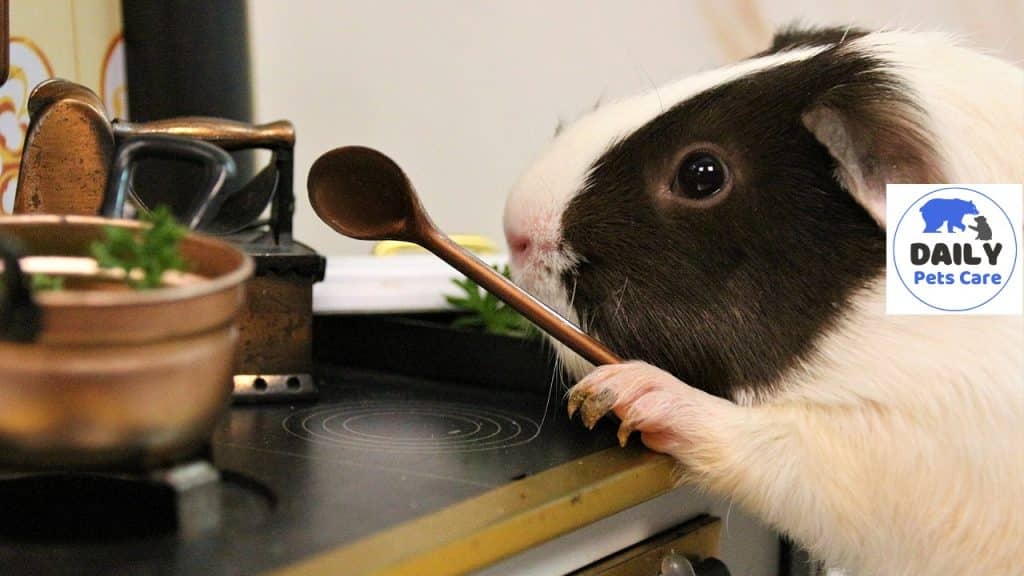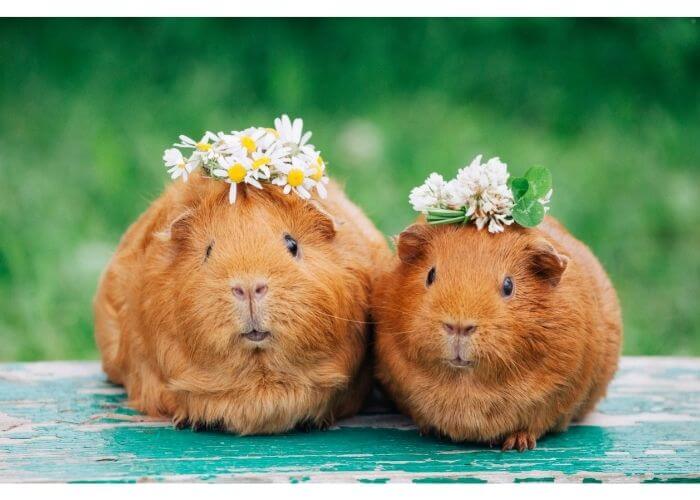Apart from hay, veggies and fruits are superb dietary provisions for guinea pigs. Guinea pigs enjoy everything from green beans to parsley, broccoli, carrots, and fruits.
But can guinea pigs eat peas?
Guinea pigs can eat peas since it isn't harmful if served correctly. Besides, peas are low in fat but rich in fiber, vitamins, phosphorus, and more. The kind of peas that guinea pigs can eat is raw peas. Nevertheless, peas are bad for guinea pigs when cooked due to bloating and digestion problems.
Can Guinea Pigs Eat Peas?
Have you watched your pig eat leaves and wondered, “Can guinea pigs eat peas?” Well, peas contain phosphorus, fiber, folate, manganese, and iron. Moreover, they are rich in vitamins like thiamine, A, C, and K.
Here is how the above elements improve your guinea pig's life quality:
Thiamine
Thiamine helps digestion by breaking down carbohydrates into glucose for energy production. It also improves metabolism and aids in weight loss.
When cavies consume high amounts of carbs, their bodies convert them into glycogen. Glycogen stores up fat inside the liver.
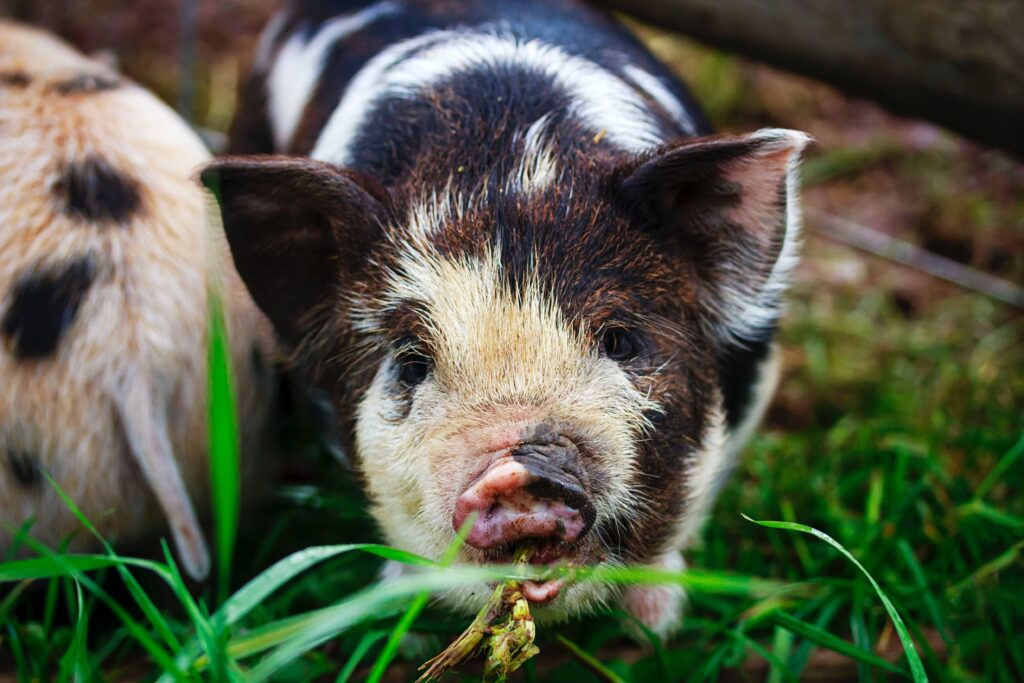
Insulin is an essential component in blood sugar regulation. Lack of insulin leads to the accumulation of fats in the liver. The vitamin converts carbs into glucose which enters the bloodstream.
Once glucose reaches the brain, it stimulates the release of insulin. Hence, thiamine helps increase the amount of insulin released by the pancreas. Hence, it prevents the excessive storage of fats in the liver and helps check your pig's weight.
Vitamin A
This vitamin has anti-inflammatory properties and protects against infections. Vitamin A deficiency may cause
- Skin lesions
- Diarrhea
- Poor wound healing
- Bone deformities
- Premature birth.
Moreover, guinea pigs need this vitamin for vision development and maintenance. The retina contains rods and cones which detect light and send signals to the brain. In turn, these photoreceptors contain rhodopsin. Rhodopsin comes from many substances, including vitamin A.
Additionally, vitamin A also promotes immune function. The retina contains microglia, which activate during inflammation. Activated macrophages secrete cytokines that damage surrounding tissues.
Vitamin A inhibits the activation of microglial cells. Hence, it reduces the secretion of pro-inflammatory cytokines.
Vitamin C
Vitamin C helps maintain collagen synthesis. In effect, collagen provides strength to bones, muscles, tendons, ligaments, and more. It also aids in the absorption of iron and zinc. What's more, Vitamin C also:
- Minimizes the chances of scurvy contraction
- Protects bones from osteoporosis
- Promotes growth of new capillaries
- Boosts immunity
- Improves cardiovascular health
- Reduces the risk of cancer
Vitamin K
Vitamin K promotes blood clotting. Moreover, this vitamin is necessary for the proper functioning of calcium metabolism. Calcium maintains strong bones and teeth. On the other hand, low calcium levels cause softening of bones resulting in brittle bones.
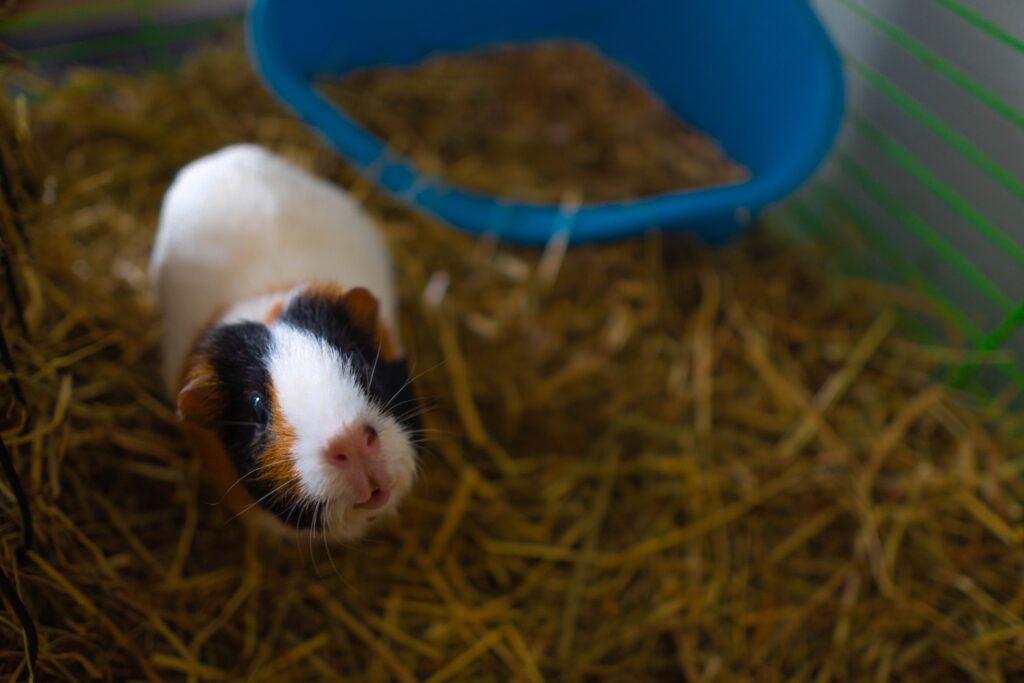
Phosphorus helps improve coat quality and ensures proper kidney operation. Also, phosphorus helps ensure guinea pig bodies use energy efficiently. Phosphorus plays many other roles, including:
- Being building blocks of DNA and RNA
- Energy production
- Cell signaling
- Muscle contraction
- Hormone regulation
- Formation of bile acids.
- Promote proper bone growth
Fiber
Moreover, dietary fiber reduces cholesterol concentration in the blood. High amounts of cholesterol in circulation lead to heart diseases.
Furthermore, fiber improves intestinal motility and stimulates peristalsis. Peristaltic contractions move contents along the intestines. These movements help digest nutrients and eliminate waste products.
Fiber slows down the transit time of digested foods through the intestines. As a consequence, fewer calories get absorbed into the circulatory system. Hence, lower-calorie absorption ensures your guinea pig isn't overweight.
What's more, fiber promotes appetite control. It makes the stomach feel full faster, so it prevents overeating. Overeating can lead to obesity. In turn, obesity may cause other serious problems such as diabetes or hypertension.
Fiber also reduces the chances of constipation. Fiber adds weight to stool and smoothens it. Bulky droppings are easier to defecate hence minimizing constipation chances. Likewise, fiber helps prevent diarrhea. Since it adds weight to feces, it makes them less watery.
Folate
Folate is an essential part of amino acid metabolism. Besides, it helps maintain healthy skin, hair, nails, and red blood cells.
Thanks to this element, the risk of congenital deformities and miscarriages reduces. Plus, it lowers homocysteine levels which reduces the risk of cardiovascular ailments.
Folate deficiency causes megaloblastic anemia. This disease causes abnormal development of erythrocytes that lack hemoglobin. Megaloblastic anemia decreases the ability to carry oxygen throughout the body. As a result, it may lead to tiredness and reduced activity.
Manganese
Manganese promotes reproduction. It increases the release of luteinizing hormone, a component vital for ovulation.
Secondly, it improves immune function. Manganese makes part of the superoxide dismutase enzyme. This enzyme breaks down the free radical superoxide to prevent cellular damage. Additionally, this enzyme is crucial as an anti-inflammatory substance.
Also, manganese is a crucial element in insulin production. For this reason, it helps in blood sugar regulation.
The element is crucial in enzyme activation to enable metabolic processes. It helps in metabolizing carbohydrates, cholesterol, and amino acids.
Other benefits guinea pigs gain by consuming manganese include:
- Helping make bones strong and flexible
- Protection against nerve disorders
- Promoting growth
- Supporting normal brain activity
- Assisting in energy production
Iron
Iron serves as a component of hemoglobin. Because of this, iron is a crucial element in oxygen distribution to body organs and energy use.
Iron deficiency tends to reduce a guinea pig's developmental rate. Hence, it makes guinea pigs smaller than average.
If your guinea pig has iron deficiency, it may experience:
- Fatigue
- Irritability
- Loss of appetite
- Delayed sexual maturation
What Kind of Peas Can Guinea Pigs Eat?
There are two main types of peas available at stores: fresh and frozen. Fresh peas should get eaten not too long after acquisition.
Frozen peas stay longer at room temperature. Both kinds of peas contain similar nutrients. The only difference between the two is how long they last before spoiling.
That said, ensure that the peas don't contain chemical additives when frozen. Also, ensure they are fresh before freezing and not cooked. Note that frozen peas may be hard to chew even after getting thawed. So, fresh peas are the best for cavies.
When looking at the three scientifically, there are three peas types:
- Sugar snap peas
- Snow peas
- English peas
The main difference is the appearance of the peas and maybe the nutrient quantity. Still, guinea pigs can eat them all.
Sugar snap peas are a cross between English peas and snow peas. Like English peas, snap peas get left in the garden until they are full. On the other hand, snow peas get harvested before they are full.
Notably, you should give your guinea pig sugar peas in moderation as they contain a high sugar amount.
Why Are Peas Bad for Guinea Pigs?
Guinea pigs can eat peas. But without providing this food source properly, the peas may be bad for your guinea pig.
As noted, three types of peas exist. Most guinea pigs enjoy sugar snap peas because of their sweetness and crunchiness. However, it's the relatively high sugar content that becomes unsafe if they overeat.
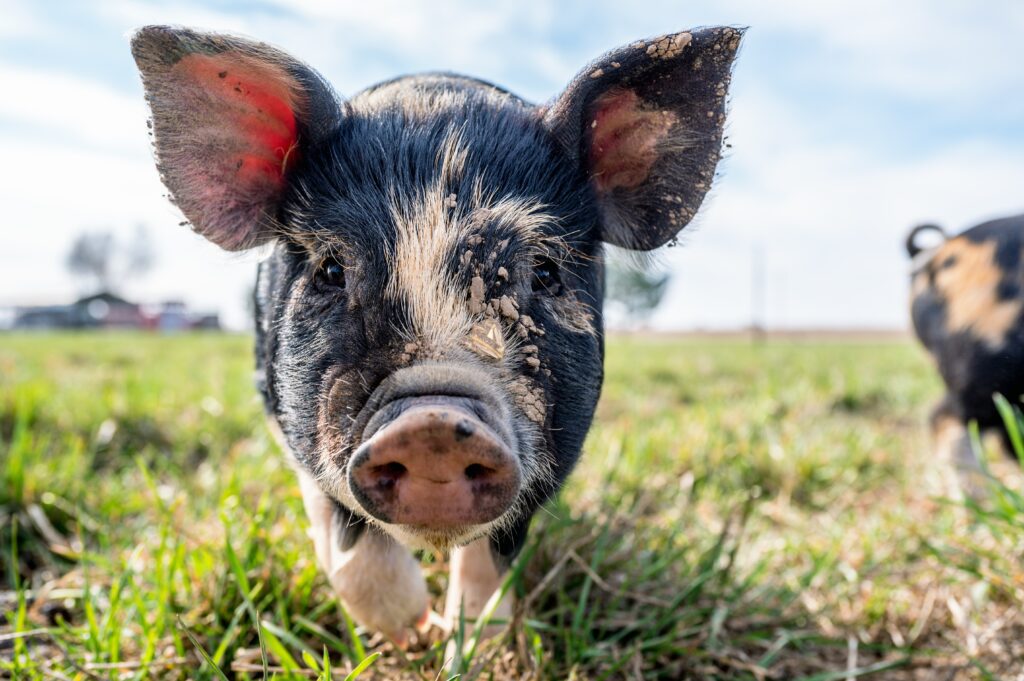
Cooked peas may cause bloating problems and may have a lower mineral supply. Hence, you should not give the leftover peas on your plate to your guinea pig.
With this in mind, you should understand how to serve peas to your guinea pigs correctly.
Ensure the peas are fresh and wash them before offering your cavy. Washing ensures you get rid of pesticides and other chemicals on the pea pods. Alternatively, you may decide to use the pea pods for other things and only offer the seeds to your guinea pig.
Still, if you want to give pea pods to your guinea pig, cut them to bite chunks.
Lastly, remember to get rid of any remnants from the cage to avoid bacterial buildup. Otherwise, the remains end up messing up your piggie's environment. It may also make the place smelly and cause stomach problems if ingested.
Frequently Asked Questions
Can You Give Guinea Pigs Frozen Peas?
Generally, you cannot give guinea pigs frozen peas as it may be unsafe. Probably, what comes to mind when looking at frozen peas are additives and cooking.
While the additives may be safe for humans, they aren't the best for guinea pigs. Moreover, frozen peas are tough to bite.
Can Guinea Pigs Eat Peas Cooked?
Guinea pigs cannot eat cooked peas. Although it's not poisonous, it contains additives like cooking oil and seasoning. These aren't ideal for your guinea pig's diet.
Additionally, guinea pigs are herbivores. Hence, uncooked veggies are the best as guinea pigs can digest cellulose.
Can Guinea Pigs Eat the Whole Snap Pea?
Guinea pigs can eat the whole snap pea and even two once in a while. Remember, sugar snap peas contain more sugar. Thus, snap peas may result in obesity if your guinea pig overeats them each day.
Sure, snap peas are advantageous like other peas. However, the shortcomings resulting from binge eating snap peas outmatch the benefits.
Conclusion
So, can guinea pigs eat peas? Yes, provided you keep things fresh and at room temperature. Your piggie has many advantages to gain from pea consumption.
Also, there are no health risks associated with eating peas in healthy servings. Some prefer feeding cavies peas over carrots or broccoli due to their nutrients.
